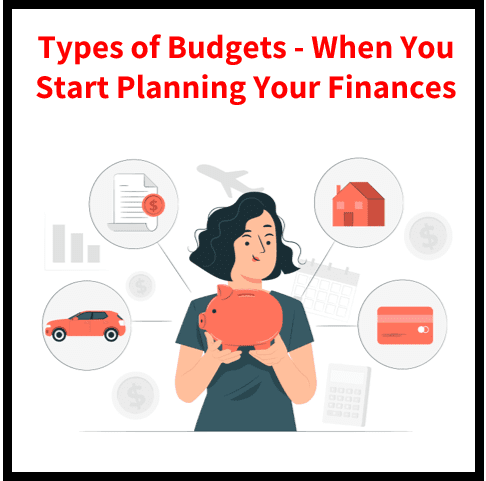When you hear the word “budget” your first thoughts probably aren’t good. After all, what’s a budget got to do with financial planning? Unfortunately, the truth is that a budget can be a scary prospect for many people. After all, how can you possibly know if you’re spending money on the things that are worth spending money on and how to you even start making budgeting decisions?
The good news is that there are many different types of budgets and each has their own unique set of considerations. It’s important to understand that there are many different types of budgets and that not all of them will be the same for the same person. What you budget for, how you allocate your money, and how you budget will all depend on many different factors. So, to help you get a better idea of what’s involved when you start planning your finances, here is a brief run down.
What is a Budget, Anyway?
A budget is a plan that helps you stay on track with your finances. It’s not meant to be permanent and it’s not meant to be rigid. Instead, a budget is a plan that helps you stay focused on what you have control over and inspired to make changes if necessary. While a budget is a great way to start planning your finances, it’s important to understand that there are many different types of budgets and that not all of them will be the same for the same person. What you budget for, how you allocate your money, and how you budget will all depend on many different factors.
How to use a budget
Budgeting can be a very helpful tool if used properly. First, you need to decide on how much money you want to budget for each month. Next, you need to decide on how much to budget for your monthly expenses and job-related expenses (i.e. healthcare, taxes, mortgage, car repair). Once you have these parts of your budget in place, you can start to plan your money well in advance. This will help you stay on track and avoid overspending.
Why you should have a budget
If you’re like many people, you don’t start budgeting until your first year of university. Even then, most people only start to budget after they start working or have children. After that, most people’s budget gets progressively less accurate. Why should you have a budget, anyway? Having a budget can be very helpful if you’re like many people and don’t know how to account for money. It’s important to remember that a budget is a tool and that you should use it correctly. A budget should be treated as if it were a money tree — make sure you only take out what you need and don’t overspend.
The requirements for a valid budget
First, a budget needs to be realistic. The budget needs to account for all of your expenses, not just the things that you have control over (i.e. rent, food, gas, transportation, education, etc.). A budget that’s too restrictive would be hard to follow. Additionally, a budget must account for contingencies. For example, if you’re not sure how you’ll pay your rent or if you accidentally burn your house down, you need to be able to cover the costs related to that incident. A budget can never be 100% accurate — that’s why it’s called a budget!
The challenges of budgeting
Budgets are a challenge. The first challenge is that you have to know what expenses to control. For example, healthcare and taxes are probably two of the most difficult expenses to budget for. Fortunately, healthcare is one of the most covered expenses on your insurance so it’s something you can estimate for. Similarly, taxes are something you can estimate for but they can definitely be challenging to predict.
How to make budgeting decisions
Another challenge with budgets is making sure that the numbers add up. This is usually easy to do when you keep track of your spending but it’s important to remember that money is not growable so you need to budget for what you need to have access to in the future.
The 3 primary types of budgets
There are many different types of budgets and all have their own specific set of considerations. Here are some of the most common types of budgets: Expenses only – This is the most common type of budget and the one that most people are familiar with. It just covers expenses and doesn’t account for income or savings. Contingency – This budget allows for expenses that are out of your control like an emergency room visit or car repair. Assets only – This budget is all about the money you have and doesn’t require you to account for any liabilities.
The 3 most common types of financial goals
There are many different types of budgets and many different reasons why someone might choose one of the following as their financial goal: Pay off a debt – This may seem like a no-brainer but the truth is that many people don’t have a clear understanding of how much money they have on hand to cover unexpected expenses and how they’re supposed to pay off their debt. Maximize your retirement savings – This is another common reason people start their budget. They want to make sure they have enough money saved to cover their retirement, preferably in case something unexpected happens. Build a emergency fund – This is the money you put away before bills come due and can help you cover the cost of living during times of crisis.
The benefits of having a budget
Having a budget can be very beneficial if you stick to it. Here are some of the benefits of keeping a budget: Helps you identify spending issues and address them upfront. Keeps you from making bad financial decisions. Helps you stay accountable for your spending. Saves you time and energy from having to track your spending and make changes when you know there is room for improvement.
Final Words
A budget is a plan that helps you stay on track with your finances. It’s not meant to be permanent and it’s not meant to be rigid. Instead, a budget is a plan that helps you stay focused on what you have control over and inspired to make changes if necessary. While a budget is a great way to start planning your finances, it’s important to understand that there are many different types of budgets and that not all of them will be the same for the same person. What you budget for, how you allocate your money, and how you budget will all depend on many different factors.





13 thoughts on “Types of Budgets: A Beginner’s Guide to Financial Planning”
[…] responsible for managing the financial aspects of a company. They oversee financial planning, budgeting, financial reporting, and risk management. CFO works closely with other executives to develop […]
… [Trackback]
[…] Info to that Topic: skillfine.com/types-of-budgets-financial-planning-guide/ […]
… [Trackback]
[…] Here you can find 50637 more Info on that Topic: skillfine.com/types-of-budgets-financial-planning-guide/ […]
… [Trackback]
[…] Read More Info here on that Topic: skillfine.com/types-of-budgets-financial-planning-guide/ […]
… [Trackback]
[…] Read More on to that Topic: skillfine.com/types-of-budgets-financial-planning-guide/ […]
I may need your help. I tried many ways but couldn’t solve it, but after reading your article, I think you have a way to help me. I’m looking forward for your reply. Thanks.
Reading your article helped me a lot and I agree with you. But I still have some doubts, can you clarify for me? I’ll keep an eye out for your answers.
Экспресс-строения здания: бизнес-польза в каждой части!
В современной сфере, где моменты – финансы, здания с высокой скоростью строительства стали реальным спасением для предпринимательства. Эти современные конструкции обладают надежность, экономичное использование ресурсов и ускоренную установку, что обуславливает их лучшим выбором для разных коммерческих начинаний.
[url=https://bystrovozvodimye-zdanija-moskva.ru/]Быстровозводимые здания цена[/url]
1. Высокая скорость возвода: Минуты – важнейший фактор в коммерции, и скоро возводимые строения обеспечивают существенное уменьшение сроков стройки. Это высоко оценивается в моменты, когда срочно требуется начать бизнес и начать монетизацию.
2. Бюджетность: За счет совершенствования производственных процессов элементов и сборки на площадке, затраты на экспресс-конструкции часто уменьшается, по сопоставлению с обыденными строительными проектами. Это способствует сбережению денежных ресурсов и получить более высокую рентабельность инвестиций.
Подробнее на [url=https://bystrovozvodimye-zdanija-moskva.ru/]http://www.scholding.ru/[/url]
В заключение, быстровозводимые здания – это оптимальное решение для коммерческих инициатив. Они включают в себя скорость строительства, эффективное использование ресурсов и твердость, что придает им способность отличным выбором для деловых лиц, готовых к мгновенному началу бизнеса и извлекать прибыль. Не упустите возможность сэкономить время и средства, наилучшие объекты быстрого возвода для вашего предстоящего предприятия!
Экспресс-строения здания: коммерческая выгода в каждой детали!
В сегодняшнем обществе, где время – деньги, экспресс-конструкции стали реальным спасением для компаний. Эти новаторские строения включают в себя устойчивость, экономическую эффективность и скорость монтажа, что обуславливает их лучшим выбором для различных коммерческих проектов.
[url=https://bystrovozvodimye-zdanija-moskva.ru/]Быстровозводимые здания[/url]
1. Быстрота монтажа: Моменты – наиважнейший аспект в экономике, и здания с высокой скоростью строительства позволяют существенно сократить время монтажа. Это особенно выгодно в ситуациях, когда срочно требуется начать бизнес и начать получать прибыль.
2. Финансовая экономия: За счет усовершенствования производственных процессов элементов и сборки на месте, финансовые издержки на быстровозводимые объекты часто оказывается ниже, по отношению к обычным строительным проектам. Это дает возможность сэкономить деньги и обеспечить более высокий доход с инвестиций.
Подробнее на [url=https://bystrovozvodimye-zdanija-moskva.ru/]https://scholding.ru[/url]
В заключение, сооружения быстрого монтажа – это лучшее решение для коммерческих проектов. Они объединяют в себе молниеносную установку, финансовую выгоду и высокую прочность, что делает их наилучшим вариантом для предприятий, готовых к мгновенному началу бизнеса и получать доход. Не упустите шанс экономии времени и денег, прекрасно себя показавшие быстровозводимые сооружения для вашего следующего проекта!
Скоро возводимые здания: экономический доход в каждом строительном блоке!
В современной реальности, где минуты – капитал, сооружения с быстрым монтажем стали настоящим выходом для компаний. Эти современные конструкции объединяют в себе повышенную прочность, финансовую выгоду и быстрый монтаж, что обуславливает их превосходным выбором для различных коммерческих проектов.
[url=https://bystrovozvodimye-zdanija-moskva.ru/]Каркас быстровозводимого здания из металлоконструкций цена[/url]
1. Молниеносное строительство: Секунды – самое ценное в экономике, и быстровозводимые здания позволяют существенно сократить сроки строительства. Это особенно выгодно в моменты, когда актуально оперативно начать предпринимательство и начать монетизацию.
2. Бюджетность: За счет оптимизации производства и установки элементов на месте, стоимость быстровозводимых зданий часто уменьшается, по сопоставлению с традиционными строительными задачами. Это позволяет получить большую финансовую выгоду и достичь более высокой инвестиционной доходности.
Подробнее на [url=https://bystrovozvodimye-zdanija-moskva.ru/]http://scholding.ru[/url]
В заключение, быстровозводимые здания – это оптимальное решение для коммерческих задач. Они объединяют в себе ускоренную установку, экономичность и твердость, что обуславливает их отличным выбором для предпринимателей, стремящихся оперативно начать предпринимательскую деятельность и получать прибыль. Не упустите возможность сократить затраты и время, превосходные экспресс-конструкции для вашего следующего проекта!
Наша команда профессиональных исполнителей предоставлена предложить вам современные подходы, которые не только снабдят долговечную охрану от зимы, но и дарят вашему собственности оригинальный вид.
Мы работаем с самыми современными материалами, сертифицируя долгосрочный срок службы службы и блестящие решения. Изолирование внешней обшивки – это не только сокращение расходов на отоплении, но и ухаживание о природной среде. Сберегательные подходы, какие мы производим, способствуют не только зданию, но и сохранению природной среды.
Самое важное: [url=https://ppu-prof.ru/]Цена м2 утепление фасада дома[/url] у нас стартует всего от 1250 рублей за кв. м.! Это бюджетное решение, которое превратит ваш дом в подлинный тепловой район с небольшими затратами.
Наши проекты – это не просто теплоизоляция, это постройка пространства, в котором каждый деталь выражает ваш уникальный образ. Мы примем все все ваши потребности, чтобы осуществить ваш дом еще больше комфортным и привлекательным.
Подробнее на [url=https://ppu-prof.ru/]https://www.ppu-prof.ru[/url]
Не откладывайте труды о своем жилище на потом! Обращайтесь к мастерам, и мы сделаем ваш жилище не только теплым, но и более элегантным. Заинтересовались? Подробнее о наших сервисах вы можете узнать на официальном сайте. Добро пожаловать в пределы удобства и высоких стандартов.
Наша группа квалифицированных исполнителей приготовлена предлагать вам передовые средства, которые не только снабдят надежную покров от холодильности, но и подарят вашему жилью модный вид.
Мы трудимся с современными составами, ассигнуруя долгий срок эксплуатации и замечательные результаты. Утепление фасада – это не только экономия ресурсов на тепле, но и забота о природной среде. Энергоспасающие инновации, какие мы применяем, способствуют не только вашему, но и сохранению экосистемы.
Самое главное: [url=https://ppu-prof.ru/]Утепление стен снаружи услуги[/url] у нас стартует всего от 1250 рублей за квадратный метр! Это доступное решение, которое переделает ваш помещение в действительный комфортный угол с небольшими расходами.
Наши примеры – это не исключительно утепление, это создание пространства, в где каждый член отражает ваш собственный модель. Мы возьмем во внимание все все ваши потребности, чтобы переделать ваш дом еще еще больше уютным и привлекательным.
Подробнее на [url=https://ppu-prof.ru/]http://www.ppu-prof.ru/[/url]
Не откладывайте труды о своем доме на потом! Обращайтесь к спецам, и мы сделаем ваш корпус не только теплым, но и изысканнее. Заинтересовались? Подробнее о наших предложениях вы можете узнать на портале. Добро пожаловать в сферу гармонии и стандартов.
Наша группа квалифицированных специалистов проштудирована предъявить вам инновационные методы, которые не только гарантируют надежную протекцию от холодных воздействий, но и подарят вашему жилью модный вид.
Мы деятельны с самыми современными материалами, сертифицируя долгосрочный срок эксплуатации и замечательные эффекты. Теплоизоляция наружных стен – это не только экономия на отапливании, но и забота о окружающей среде. Экономичные инновации, какие мы производим, способствуют не только зданию, но и сохранению природных богатств.
Самое ключевое: [url=https://ppu-prof.ru/]Сколько стоит утепление стен снаружи[/url] у нас стартует всего от 1250 рублей за м2! Это доступное решение, которое превратит ваш домашний уголок в действительный теплый район с минимальными затратами.
Наши проекты – это не только теплоизоляция, это постройка территории, в где каждый аспект символизирует ваш свой образ. Мы примем во внимание все ваши пожелания, чтобы осуществить ваш дом еще больше комфортным и привлекательным.
Подробнее на [url=https://ppu-prof.ru/]официальном сайте[/url]
Не откладывайте дела о своем жилище на потом! Обращайтесь к экспертам, и мы сделаем ваш дворец не только теплым, но и по последней моде. Заинтересовались? Подробнее о наших делах вы можете узнать на сайте компании. Добро пожаловать в сферу уюта и уровня.